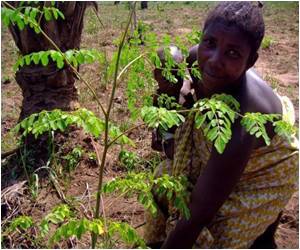The Moringa - a tropical plant is said to be Sierra Leone's nutritional dynamite. Tropical plant is overflowing with nutrients and a source of natural healing in the country, say officials.

In Sierra Leone, President Ernest Koroma himself regularly takes Moringa oil, one form of the plant, boasts Jonas Coleman of the country's Moringa Association.
In a recent interview with AFP, Agriculture Minister Sam Sesay described Moringa as "the most nutritious plant on earth, and each and every part of it has nutritional and medicinal values that have the propensity to cure over 300 diseases, including hypertension and diabetes."
"Very soon, the cultivation of the Moringa tropical plant in Sierra Leone may likely put some medical practitioners out of business," he quipped.
Doctors may not agree with that, but they do agree on the value of Moringa.
"It sure is a good herbal plant complementing our medical practice. Anything that provides good health is worth our nod," said private practitioner Harry Sankoh in the northern city of Makeni.
Advertisement
The country, which was ravaged by a decade-long war which ended in 2002, has one doctor for every 17,000 people and one nurse for every 8,000, according to health ministry statistics.
Advertisement
The United Methodist Committee on Relief (UMCOR) which has promoted its use in Ghana and Liberia says it first brought the seeds to Sierra Leone in 2001, later training some 150 farmers on how to cultivate it.
Freetown botanist Christian Jones, says: "It is likely that it was one Pakistani soldier serving in the UN Peace mission who discovered the presence of Moringa in the 1990s in the back yard of a house in the capital."
Catholic NGO Caritas recently led a campaign to popularise the use of Moringa by distributing samples in the northern city Makeni, urging some 2,000 residents to replant them in their back yards and farms.
Coleman said "a total of 250,000 seeds were distributed to people across the country last year to engage people in some form of economic venture."
Makeni, however remains the hub of Moringa production where a factory has been established and is marketing the commodity to other parts of the country.
District Forest Officer Fomba James, who has over 15 years of herbal experience, describes Moringa as "a powerhouse of nutritional values."
"It contains seven times the vitamin C found in oranges, four times the calcium in milk, four times the vitamin A in carrots and three times the potassium in banana," he told AFP.
According to UMCOR's website, the plant contains some 46 antioxidants and is loaded with phytonutrients, which flush toxins from the body, purify the liver and bolster the immune system.
Alimamy Lahai is a Moringa door-to-door salesman, who sells Moringa products in Freetown.
"It is a profitable business as sales are now high given the recent publicity of the product. I sell the powder which is packaged in sachets for about two dollars and the teabags for about four dollars."
In the northern town of Port Loko, tribal headman Jimmy Lagbo told AFP by telephone: "We see it as a cure-all and many folks in my community are no longer visiting the local clinics as they are now using either moringa teabags or sprinkling the powder on their daily meals."
Source-AFP








